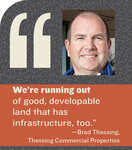YOUR BUSINESS AUTHORITY
Springfield, MO
YOUR BUSINESS AUTHORITY
Springfield, MO




One thing Jackie Joy Eoff knows about being a developer is the importance of being observant and patient.
Eoff, vice president of Eoff & Associates Inc., is experiencing one of the more enjoyable aspects of development as she watches the first building rise in Fountain Place, an 8.7-acre retail and office project on South Fremont Avenue at Erie Street. A new Avanzare Italian Dining restaurant is the first building to rise on the site and looks to open in February 2024.
Eoff & Associates owns the property through its subsidiary, Fountain Place LLC. Metro Builders Supply Inc. has signed on for another of the site’s four lots, and two other sites remain available.
Eoff says her company had long had an eye on the property.
“You have to have patience,” she says. “You have to know the land well enough. We had been watching that land for quite some time.”
When the land became available, Eoff & Associates took the leap, even though developing within the city of Springfield can have its challenges.
“We had to go through zoning and the city – there are a lot more hoops to jump through than if we would have been on the outskirts of Springfield,” she says.
The Eoffs have been in the business for a while, she says, noting her husband, DuWayne, incorporated the company in 1981. She’s learned during that time that not every piece of land is equal.
What’s under the surface can bring challenges, she notes – limestone, for instance, can be hard to build on, and drainage issues are not always apparent.
Beyond physical features of a property, there’s the issue of where it is.
“It’s location, location, location,” Eoff says. “Sometimes locations aren’t ready yet. Can you sit there and hold a piece of ground, especially some of these more valuable pieces? Some people can do it without financing, and some people can’t.”
She says she and her husband financed a lot through the years, building equity in companies and land.
“You can’t build with emotion. It could be decades before that land is ready to be developed,” she says. “Unless you are financially in a position where you can just hold it, you may not want to invest.”
Eoff says a developer has to perform due diligence.
“You do research sometimes six months to a year before you ever actually purchase the land, if you’re smart – or you’d better be able to pay your way out of it,” she says.
But waiting and watching can pay off.
“Sometimes it’s just luck,” she says. “You can make things happen, but you also have to make them financially feasible, and that’s not always the case.”
Lining up the pieces
Another developer who is accustomed to playing the long game is Brad Thessing of brokerage firm Thessing Commercial Properties LLC.
Thessing is currently seeing the results of waiting come to fruition on the city’s north side, where he brought a Whataburger restaurant in May at the site of the former Springfield Inn at the intersection of Glenstone Avenue and Kearney Street. Chick-fil-A is taking shape to the north of the hamburger eatery, and Thessing has already taken advantage of tax increment financing to develop a Kum & Go convenience store and a Take 5 Oil Change across the street. On the northwest corner of the intersection, Thessing manages a retail center, owned by O’Reilly Hospitality Management LLC, that is home to Echelon Coffee, AT&T and, soon, Crumbl Cookies.
The area has been identified by the city as a qualified opportunity zone, offering tax incentives for those who invest there.
For Thessing, the intersection reflects a long process of getting the pieces lined up. It’s something that requires vision.
“You have to look at the area in terms of all the possible tenants that aren’t there that the area could service,” he says. “You have to have a vision of what could be there – what could be approved that makes sense for tenants.”
The demographics must be right for a business to locate somewhere, Thessing says, whether on a corner or in a city. An example is Trader Joe’s, which he says requires a metro area of at least 1 million people and a relatively high median income to invest. Springfield’s metro is just under half of that population target, and its household income is nearly half the national average.
The city brings other challenges, according to Thessing, who cites rising rates of homelessness and crime as factors that give businesses pause.
“Tenants look at all of that,” he says.
A majority of respondents to the 2023 Springfield Business Journal Economic Growth Survey – 52% – say they would like the government to help minimize the issue of safety and security in the city. FBI crime statistics for 2022 showed 14,283 total crimes in Springfield, amounting to about 8,500 crimes per 100,000 residents – a rate that is 261% higher than the national rate and 175% above Missouri’s, according to North Carolina-based research firm HomeSnacks.
Complicating matters in the city is the fact that Springfield is built out.
“We’re running out of good, developable land that has infrastructure, too,” Thessing says.
All of these factors add to the complexity of development, according to Thessing.
“The process is very slow, and in the city of Springfield, the process can be very lengthy, compared to other municipalities,” he says.
Government intervention is desired by many respondents in the Economic Growth Survey, with 46% calling for the government to improve and invest in capital infrastructure and 35% expressing the desire to streamline the permitting process in the city. Another 33% say reducing business property tax is a priority.
The developments at Glenstone and Kearney were four to five years in the making, he says, and involved getting control of the property and working with tenants through the design process.
Corridor allure
According to Curtis Jared, CEO and president of Jared Management LLC and Jared Commercial Real Estate LLC, development moves can look questionable from the outside.
“I make my living off of leasing space, but it’s always the initial conversation – ‘Well, why would you buy that?’” he says. “I say, ‘You’re missing the point.’ It’s not about the tenant; it’s about the quality of the real estate.”
Jared, speaking in a July CEO Roundtable with SBJ Executive Editor Christine Temple, says many people fail to understand what it takes to purchase a corridor.
“You have to go to multiple owners to make something like that happen when a great corridor comes on the market,” he says. “We just don’t get them very often anymore in Springfield.”
Some of the hottest corridors are along Glenstone and Campbell avenues, he notes.
“Good real estate doesn’t change hands too often,” Jared says, adding the 65804 ZIP code – roughly, the Battlefield Mall corridor – was recently listed by Realtor.com as the third hottest area in the state.
Acquiring properties along desirable corridors may require a significant investment of time, according to Jared.
Developers also bide their time while keeping an eye out for redevelopment opportunities. It’s a point Ryan Murray, CEO of R.B. Murray Co., offered in the roundtable discussion.
“Inflation and interest rates have driven the cost for new construction up,” he says. “It makes redevelopment even that much more appealing.”
Location counts, and economic considerations go hand in hand with it, Murray says.
“Your greenfield costs have gotten to the point where they’re so astronomical that you can more easily redevelop something in a good location, if you can find it, whereas before it may not have made the most sense to spend similar money to wind up with something that’s not brand new,” he says.
Moseley’s Discount Office Products was purchased; Side Chick opened in Branson; and the Springfield franchise store of NoBaked Cookie Dough changed ownership.
Warby Parker store planned in Springfield
Open for Business: Moseley’s Discount Office Products
Biblical history attraction planned at former Andy Williams theater
$337K in ARPA funds awarded by Greene County
Photo Gallery: 2024 Men of the Year
Hamra Enterprises creates role to support philanthropic work